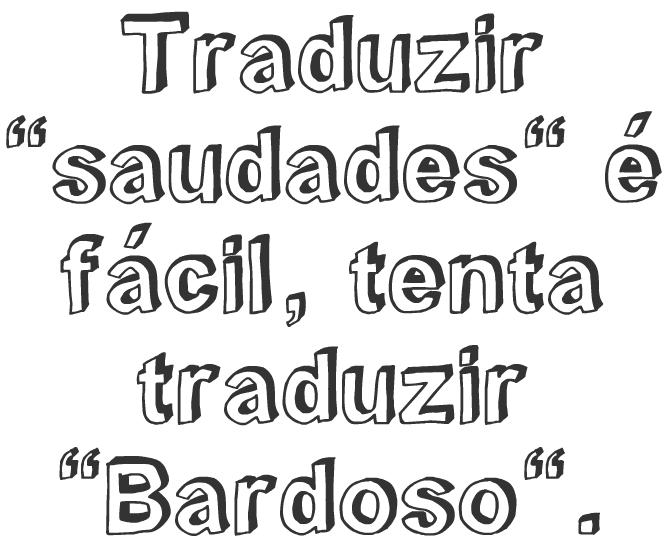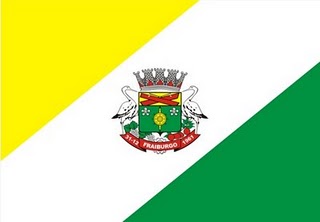
Apesar de ser um conceito facilmente utilizado e interpretado pelas pessoas “fraiburgófonas” (falantes do Fraiburguês), “Bardoso” é uma das palavras mais difíceis, pelo menos até agora, de traduzir do Fraiburguês para o Português, pois é um termo que remete a um estado de espírito profundo, um jeito de ser ou estar bastante comum e sem uma palavra equivalente no universo lingüístico conhecido, nem “manhoso(a)”, “dengoso(a)”, “mandrião(ona)” ou mesmo “teimoso”, juntos se equivalem a um “bardoso” bem pronunciado e contextualizado.
Pois bem, Bardoso é um adjetivo. Ex. “O piá é bardoso” ou “piá bardoso”. Raramente se vê este adjetivo flexionado no plural. Ex. “Vocês são uns bardoso”. Bardoso se refere ao sujeito do tipo tchô, tchoa (bardosa), piá ou menina que tem preferência à posição horizontal ou escorada em alguma coisa para evitar, sempre que possível, a fadiga. Estes indivíduos são otimizadores de recursos físicos por natureza, gerando quase um estilo de vida atônomo. Má vamo se combiná, quem de tanto não gostaria de levar uma vida bardosa?
Diferentemente de “dorminhoco(a)” que não se usa no diminutivo (dorminhoquinho(a)), existe o “bardosinho e a bardosinha” para indivíduos (pessoas ou animais) de pequeno porte ou muito dengosos. Ex. Um tchô pode identificar o mais preguiçoso de uma ninhada como o bardozinho – “Ó tá vendo que aquele bardozinho alí?”. Ainda, o antônimo (oposto) de bardoso é “atentado”. Ex. “Home do céu, aquele piá é atentado… dzulivre…”
Bardosos tem as seguintes características existenciais:
– Auto-estima elevada, que pode ser confundida com falta de vergonha;
– Surdez seletiva que permite ouvir apenas o que se quer e bloquear chamados;
– Preguiça ou desinteresse de fazer alguma coisa que foi ordenada;
– Jeito manhoso e dengoso (alguns casos), podendo até ser chamado de “jaguarinha” (essa é outra palavras difícil de explicar)
Bardoso não existe nos dicionários mais abrangentes da língua portuguesa, se acharam me avisem! Etimologicamente falando, o que parece, no entanto, é que antes ser definitavamente incorporado ao idioma de Fraiburgo, ele já era usado como adjetivo para os cavalos (baldoso), mas como em Fraiburgo tudo que tem “L” vira “R” temos também (culpa = curpa, malvado = marvado, folgado = forgado) e assim por diante.
De sua origem, até onde sei, existem duas frentes.
Primeira,
Eu lembro que meus primos diziam para não deixar o cavalo (petiço) comer o mato enquanto ele estivesse nos esperando, se não ele iria ficar bardoso (mal acostumado). Bardoso é alguém com barda, “não de barda para não ficar bardoso”.
Segunda,
O termo é usado para identificar qual cavalo trabalha menos e faz mais pose quando precisa puxar a carroça. Com o tempo o cavalo bardoso percebe que se ele parar de fazer força o outro cavalo fará o esforço compensatório para dar conta do trabalho, ao passo que ele só faz pose e caminha normalmente. O tchô que os coordena, por sua vez, precisa ficar de olho para o rendimento da carroça. Isso serve também para os gestores de empresas que precisam gerenciar suas empresas por indicadores ara detectar o bardosismo na empresa, o que em alguns casos pode ser contagioso. Em resumo, “bardoso é um sujeito que não se sujeita”.
Seguem alguns exemplos contextualizados:
Tentando tirar alguém da cama sem sucesso:
– “Mazé um bardoso mesmo”. Em resposta, o bardoso(a) apenas vira pro lado e continua capotado.
Negociado um grupo de trabalho na universidade.
– Vocês vão pegar o tchô tal (notoriamente bardoso) para o grupo de vocês.
Resposta
– Mas pare home!!! esse tchô é muito bardoso – Largue mão!!!
Mais exemplos? só no Frai mesmo…
Finalizando, ainda existe também o verbo “bardozear”. Ex: “Estávamos só bardozeando”
e o advérbio “bardozamente”. Ex: Eles caminham bardosamente ao redor do lago”.



